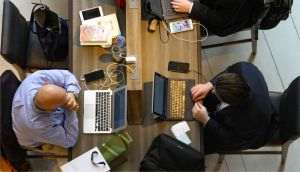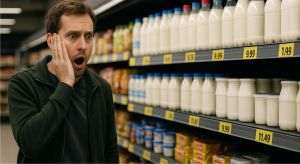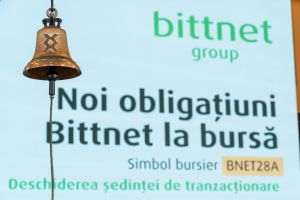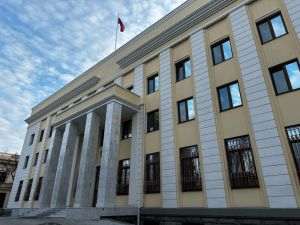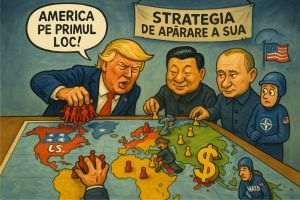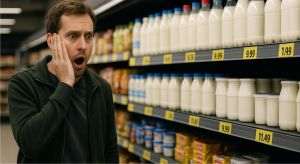• Eugen Teodorovici: "Everybody talks about a European family, but it's every man for himself"
Romania has been included among countries with macroeconomic imbalances, according to the country report of the European Commission, presented on Friday by European commissioner for regional policies Corina Creţu.
The analysis of the Commission criticizes the measures and the government effectiveness of the PSD-ALDE government, as officials in Brussels think that Romania has made "limited" progress in the implementation of the 2018 recommendations which have been addressed.
The country report, extremely critical against Romania, comes just as the country holds the presidency of the Council of the European Union.
The analysis notes that Romania's model for economic growth, "based on consumer spending, is affecting the country's ability to durably reach the EU living standard", amid the halving of the GDP increase in 2018, compared to 2017, "mostly" due to a slow down in consumption (amid rising inflation). Still, the report mentions that the advance of the Romanian economy remains solid.
Among other things, it mentions: "The slowdown of the growth of the GDP b almost half in 2018 (...) has brought up the limits of Romania's economic growth model. The significant wage increase, the shrinking workforce and the shortage of skilled personnel run the risk of undermining Romania's ability to compete internationally. Moreover, investor confidence is eroded by the persistent legislative instability, by the unpredictability of the decision-making process, of the low quality of the institutions and by the ongoing weakening of the fight against corruption. The inequality and poverty rates remain high, and the regional disparities are increasingly high.
Ensuring continuity with the previous reforms and the switch to a new investment-based growth model could set the economy on a sustainable trajectory to convergence with the EU standard of living and to contribute to the reduction of inequality".
Corina Creţu discreetly criticized the lack of structural reforms and the investment and macroeconomic policies of the government.
She pointed out four issues in the country report: "First of all, even though there is sustained economic growth, even though new jobs are being created, it is obvious that not everybody is benefiting from these results. The level of poverty among children and in the rural sector has increased significantly.
Secondly, the development is made harder by the absence of the administrative capacity. The report shows that the bureaucracy, the responsibilities and the fragmented resources prevent the provision of public services and harms investments.
Thirdly, there is a need for investments. I am thinking of education, of medical assistance, social inclusion, the transport, energy and environment infrastructure. Investments in these areas would bolster Romania's long term growth potential and would improve the living standard, (...) and fourth of all, I want to point out that the regions and regional specifics mater. Cohesion and competitiveness cannot be reached by applying a single recipe. When it comes to DGRegio, we have developed this concept of intelligent specialization , to make each region build on its strengths and improve its weaknesses. We need different investments on a regional level and tailored, flexible policies, which would answer the local needs and challenges".
Referring to how Romania could improve the investment environment, according to the recommendations of the European Commission, he said: "One of the proposals of the Commission of the multi-annual financial framework 2021-2027 concerns a tighter connection of the cohesion policy with the European Semester (ed. note: the country report). In the draft project of the European Commission, which is being put up for debate between the European Parliament and the European Council, this connection is being proposed. We are talking about a better alignment of the cohesion funds to the analysis and recommendations of the semester, so that we can improve the impact and the efficiency of European grants".
In response, finance minister Eugen Teodorovici stated that the Country report of the Commission provides a pessimistic vision on Romania's macroeconomic situation, in line with the forecasts of the European Commission, but also that the underestimation of the Romanian economy can also influence the markets and the investors' economic sentiment.
He added: "The underestimation of a trend at a forecast level can act like a self-fulfilling prophecy, meaning that it manipulates the confidence of economic entities. In this scenario, the author of the forecast risk very little because the effect of the forecasts tends to be confirmed. But the market effects are not subject to appeal".
Teodorovici pointed out that according to the results of the analysis, every country that has been the object of a thorough analysis, namely thirteen states, have been classified as states facing imbalances or excessive imbalances.
"Romania has been ranked among countries with imbalances even though just one ratio in the analysis chart exceeded the benchmark, namely the GDP percentage of the net investment position. (...) It bears mentioning that out of the fifteen states that are not facing imbalances, there isn't one that meets the specific thresholds of all the indicators included in the analysis", the Romanian finance minister said.
The official also noted that the Romanian economic growth rate is 2.2% above the average rate of EU28, net investments in the economy have increased 0.8% over last year, the number of employees has increased 124,000 in Q4 2018, and the unemployment rate reached a historic low of 3.9% in January 2019, as well as the fact that foreign direct investments have amounted to 4.6 billion Euros, up 2.8% over 2017.
Eugen Teodorovici said that the political position of the Romanian government in relation to the European partners is that all European citizens are created equal and should be treated as such, as he subsequently referred to, among other things, in the case of the double standard concerning the differences between the foods in Western and Eastern Europe.
In the context of the European parliament elections, the minister also said that Mrs. Corina Creţu is in full electoral campaign, while the European commissioner said that the European executive is made up of politicians, not technocrats, to which she added that the country report represents the work of hundreds of people from the general departments of the EC CE and that it represents the official position of the Commission.
Teodorovici further said: "In most cases there is playacting of dialogue, there is playacting of interest towards the member states, their cohesion, and especially there is playacting towards the citizens of the European Union": "All that we are asking for is an equal treatment between states. I think that in drawing up the study have also been taken into account some statements made in the media that were sometimes irresponsible. One of the important elements, for us as a country, is that the administration in Romania, definitely without realizing, has moved on to a different level, has learned how to carry out talks on a European level. It is an important thing, because we are talking about the European family, which is nice in theory, but it's every man for himself".
The minister concluded by saying that in the European Commission, nothing is technical, everything is political.
The country report also mentions that the labor market is being subjected to increasingly high pressures; that we have the lowest unemployment rate in the last ten years (3.8%), the shrinking workforce and a persistent shortage of qualified personnel leading to an almost complete employment of the workforce in Romania, which makes recruitment difficult and leads to rising wages.
The report also shows that the public deficit has increased, especially as a result of wage expenditures and the tax breaks; "the taxation rates have been lowered repeatedly, while salaries in the public sector have increased significantly since 2015 and they are expected to be raised further; public investments have decreased in 2017 to the lowest level in the period that followed the EU accession.
According to the quoted source, the stability of the financial sector has been placed under pressure, with the measures recently passed by the Parliament and the government creating risks to the stability of the financial sector, which could have negative impact on lending and limit the impact of the monetary policy.
MIHAI GONGOROI
• Corina Creţu and Eugen Teodorovici exchanged barbs at the presentation of the Country Report
The atmosphere in Friday's conference occasioned by the Country Report of the European Commission has been rather tense. European Commissioner Corina Creţu and Public Finance Minister Eugen Teodorovici addressed each other harsh lines concerning the analysis of the European Commission on Romania's macroeconomic situation. While Corina Creţu criticized the "performances" of the government, the finance minister expressed his anger at the attitude of the European commissioner, as well as at the manner in which the country report has been drafted.
Hereinafter is a segment of the dialogue between the two officials:
"Eugen Teodorovici: Obviously, our assessment, of the Romanian party, of some elements included in this document is different (ed. note: from the EC report) from certain points of view. But i am convinced that out of confrontations of opinions the best ideas arise ...
Corina Creţu: Dialogue! (ed. note: not confrontations).
Eugen Teodorovici: Dialogue... I would very much like to go to the part where I don't have to read pages. (...) With all due respect. madam commissioner is in full campaign ... How can we talk on a European level about healthy principles, and part of the commissioners be involved in campaign at the country level?! If we are going to be truly a European family, we need to clarify these things.
Corina Creţu: The European Commission is made up of politicians, not technocrats. The European Parliament and the Council have approved the fact that only the representatives of the European Commission have the right to run. Every commissioner is active in their party. This is not electoral activity. This is an activity organized by the office of the European Commission in Romania, every year. (...) It is not surprising that you do not agree with the conclusions of the report, but they represent the official position of the European Commission.
Eugen Teodorovici: Knowing very well the European Commission, at the last talk, when I was talking about where we would place a Secretariat for InvestEU, in response to a deputy commissioner who was saying that the EC was in the best area, since it was a transparent one, I said: «Commissioner, commissioner, I know the Commission better than you do; nothing in the European Commission is technical, everything is political»".
---------------------------
German foreign affairs minister, Heiko Maas last week said that the European Union should impose sanctions and cut the funding of member states that pass laws that violate the European fundamental principles, such as the independence of justice and the freedom of the press, according to Reuters.
The German official gave as an example Romania, Hungary and Poland, saying that these countries have received more from the EU than they paid out, so that the sanctions would represent a significant lever for the EU.
"There are fundamental principles that we all have to abide by", said Maas, who added: "We have to investigate where there should be financial consequences" in the case of countries that violate these principles.
"Cutting of the money is the only language they speak down there", said Maas about the countries that, for instance, pass laws that restrict the freedom of the press.
The statements come amid the initiative of the European Commission to ask for the passing of a mechanism that which ties funding to the compliance with the rule of the law. The initiative, backed by Germany, is being debated together with the EU draft budget for the 2021 - 2027 period.
Last Wednesday, the European People's Party (PPE), the main center-right transnational party of the European Parliament, has voted to suspend (not exclude) the membership of the party of Hungarian PM Viktor Orban, Fidesz, from the right-wing European family, as the government led by Orban is being accused of violating the EU principles concerning the rule of law, accusations which are also being made against Poland and Romania.


